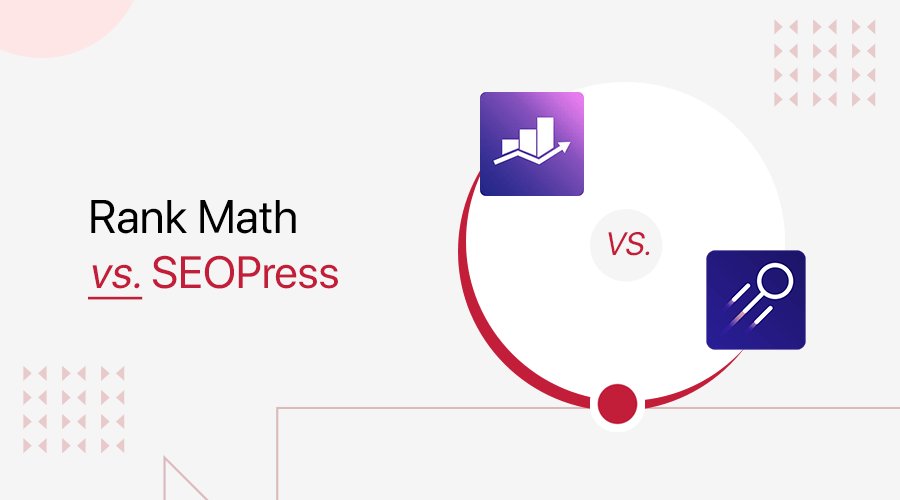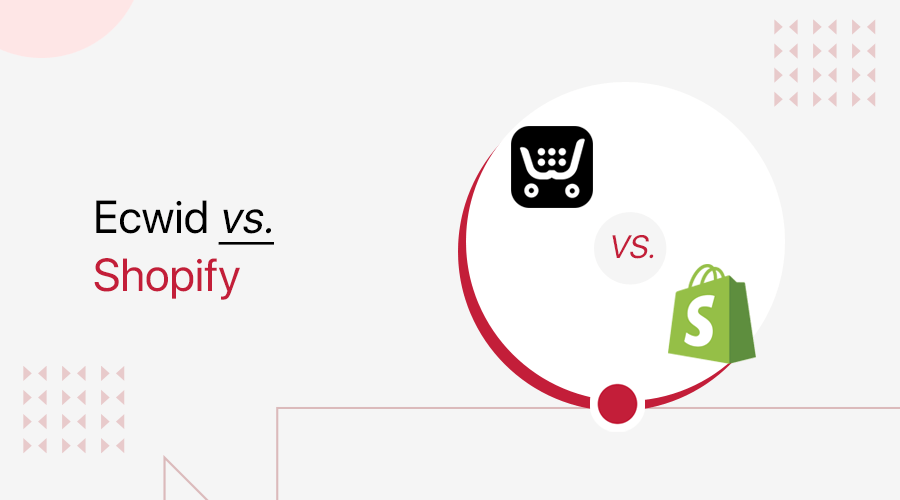
Are you wondering which is better between Ecwid vs Shopify? Or confused about choosing among these platforms for building your online store? If yes, then here we go!
Recently, you may have seen many shopping businesses carried out online. That’s because it allows them to reach more audiences and simplifies their working process.
So, you must choose a suitable eCommerce platform to build a successful online store. And both Ecwid and Shopify are popular platforms you can consider using for that.
If you’re stuck choosing between these 2 platforms, then don’t worry! To help you out, we have prepared a full comparison between Ecwid vs Shopify.
Here, we’ll compare them in terms of features, usability, support, pricing, and many other factors. So, fasten your seat belts. We are about to start!
A. Ecwid vs Shopify – Overview
Before directly moving to the comparison factors, let’s get to know these platforms in detail.
What is Ecwid?
Ecwid (short for eCommerce Widget) is an eCommerce platform by Lightspeed to build online stores. You can use it as a widget to convert your existing site, social network page, or mobile app into an online shop.
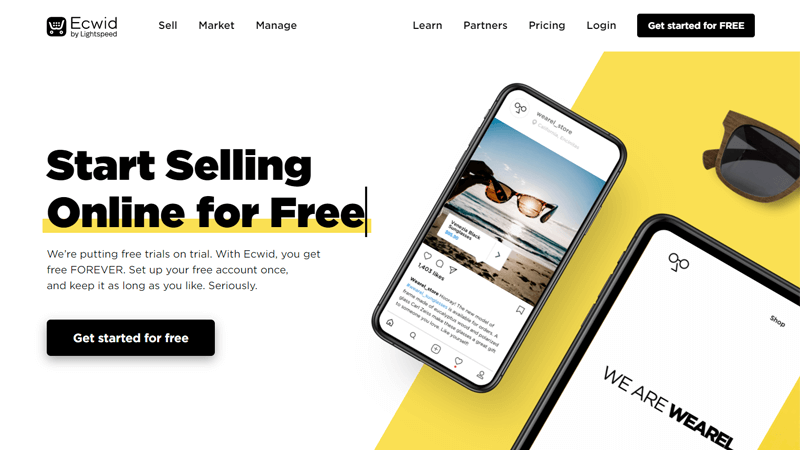
In simpler terms, it’s designed for business owners who already have a site. So, we recommend using this solution if you have an existing site and want to sell your products online.
The best part is that you don’t need to have any coding knowledge to set up an eCommerce site. This makes it most suitable for those running small to medium-sized businesses.
Not to mention, it’s also a SaaS (Software as a Service) platform where you pay a monthly fee to keep your store online. But you can also use its free plan to kickstart your online selling business.
Further, Ecwid creates an eCommerce store instantly that doesn’t require hosting. All you need to do is integrate it into your platform or CMS (Content Management System). As simple as that, isn’t it?
What is Shopify?
Shopify is one of the most popular eCommerce builders to set up an online store. Moreover, it’s a fully hosted standalone platform that gives everything you need to start your online selling business. So, you’ll get hosting service, domain, and software to instantly start working.
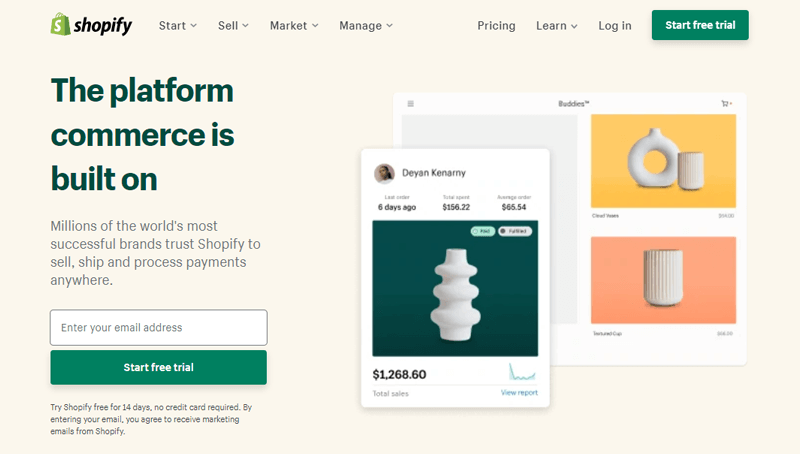
Additionally, it comes with stunning functions and powerful tools that work for businesses of all sizes. So, you can use Shopify for your small business to large or multinational business.
The main difference between Ecwid and Shopify is that Ecwid works like an integrated widget with limited features. Whereas, Shopify allows you to build an independent site.
Further, Shopify offers you all the necessary features. That includes eye-catching themes and an easy-to-use drag-and-drop builder. Moreover, you get to use multiple apps as well.
Unlike Ecwid, Shopify is a fully-paid service. So, you must pay to start using this platform. But it’s more flexible and creative. Since you cannot just build a site without coding anything, but also add custom codes to enhance your online store.
B. Ecwid vs Shopify – Key eCommerce Features
The most important factor when comparing Shopify vs Ecwid is their eCommerce features. So, it’s time to look into all their main features first. Keep reading!
Key eCommerce Features of Ecwid
The key eCommerce features of Ecwid are:
- Connect your store to popular channels like Facebook, Instagram, Amazon, Google Shopping, etc., from your Ecwid control panel.
- Able to add and sell both physical products and digital downloads from your store.
- Make your dedicated native app for customers to buy your products from their mobiles.
- Includes powerful automated marketing tools. Such as abandoned cart messages, Google and Facebook advertising, etc.
- Ability to create subscription products to build regular recurring revenue. Also, you can sell memberships to exclusive content and whatnot.
- You can give away promotional pricing, discount coupons, etc., to improve the sales.
- It lets you connect a Point-of-Sale (POS) system to accept payments from anywhere.
- Integrates with 50+ payment options such as PayPal Here and Square.
Some of the other features of Ecwid are:
- Supports translation to 45+ languages for selling the products globally.
- Uses automated taxes on transactions. So, you can pay the sales tax at year-end.
Key eCommerce Features of Shopify
The key eCommerce features of Shopify are:
- Offers 70+ professional and customizable themes by popular designers for your store.
- Includes built-in mobile commerce shopping cart. With that, visitors can browse and buy the products from any mobile device.
- Able to customize the site as per your style with full access to HTML and CSS.
- Accepts credit cards like Visa, Mastercard, American Express, and Discover. Also, it works with 100+ payment gateways.
- Supports integration to apps like Ordoro, eCommHub, and Inventory Source. This helps to set up your dropshipping business (shipment directly from vendors to customers).
- Ability to customize the automated store emails reflecting your brand.
- Contains multiple product-related features such as product variations, SEO product tags, import/export, etc.
- Gives analytics reports of the products, traffic, sales, and orders on your dashboard.
Some other features of Shopify are:
- You can use your own domain name or buy one from Shopify.
- Comes with a free SSL (Secure Socket Layer) certificate for better security.
- Improve your blog by encouraging discussions, moderating comments, etc.
- Follows top SEO (Search Engine Optimization) practices to rank well on SERPs.
Winner? – Shopify
Both Ecwid and Shopify have an extensive set of features. Ecwid does best when it comes to marketing. While Shopify creates and manages the overall eCommerce experience better.
While comparing Shopify vs Ecwid, we hand over this round’s winner to Shopify. Because Shopify comes with more features and flexibility than Ecwid. Also, it focuses on the SEO and security of your online store better than Ecwid.
C. Ecwid vs Shopify – Ease of Use
The next thing we’ll be comparing between Ecwid vs Shopify is their ease of use. That’s in terms of setting up the platform and using them to build an online shop. So, let’s go!
Is Ecwid Easy to Use?
Getting started with Ecwid is pretty easy. First, you need to go to Ecwid’s official site. There, you must choose a plan depending on your budget and business requirements from the Ecwid Pricing page.
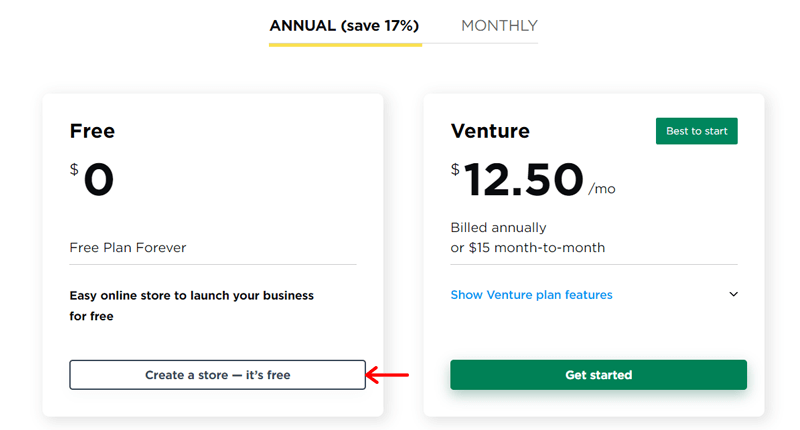
Then, you have to sign up and log in with your Ecwid account. If you want to use a premium plan, then you must complete the purchase process.
But we recommend using the free plan first to try out its features. Here, we’re doing the same!
So, after you log in, you’ll move to the Ecwid control panel that looks like this:
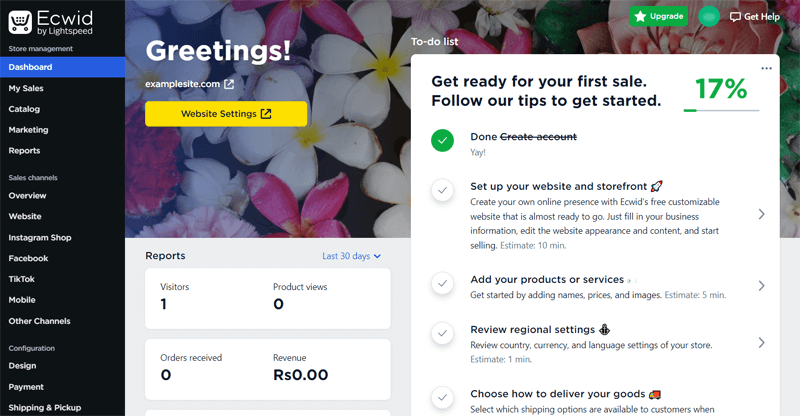
Ecwid is also popular as a WordPress plugin. So, when looking at and using the Ecwid control panel, you’ll get a similar feeling to the WordPress dashboard.
On the left side of the control panel, you can see all the menus that give options to set up your store. While on the right side, you’ll get the corresponding options of the menu you select.
Currently, you’re on the Dashboard menu with a to-do list to help you start. You can follow it to serially complete the steps for building your store.
Here, we’ll be looking to see if it’s easy to add a product to the Ecwid store.
Adding Your Products to Ecwid
Adding products to the Ecwid store is simple. Either go with the step you’ve seen in the Dashboard menu. Or just navigate to Catalog > Products from your panel.
Then, click on the ‘+ Add New Product’ button there.
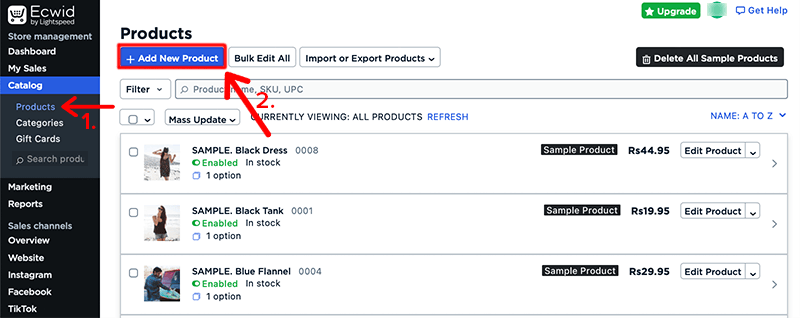
That’ll open up an editor with several sub-menus. By looking at them, you can easily fill out the information about your product.
In the General setting, you get to describe your product, add images, include price, and more. Also, you can configure the attributes, shipping and pickup, etc. in other settings.
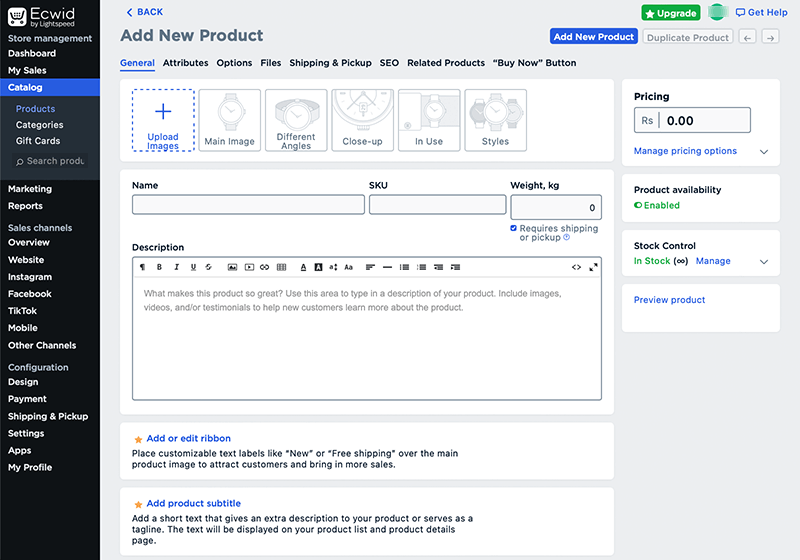
Lastly, click on the Save button or ‘Ctrl+S’ keys on your keyboard to save the product.
Integrating Your Ecwid Store in WordPress
Ecwid gives seamless integration to your site. You just need to install the Ecwid widget on the dashboard. And it can be used for any platform like Weebly, Wix, Squarespace, etc.
Let’s say you have a WordPress site and you want to add a complete eCommerce functionality to it. Since Ecwid is a good WordPress eCommerce plugin, you can easily add it to your site.
For that, just search for Ecwid on the WordPress.org plugin repository. And then, install and activate the plugin on your dashboard. That’s all!
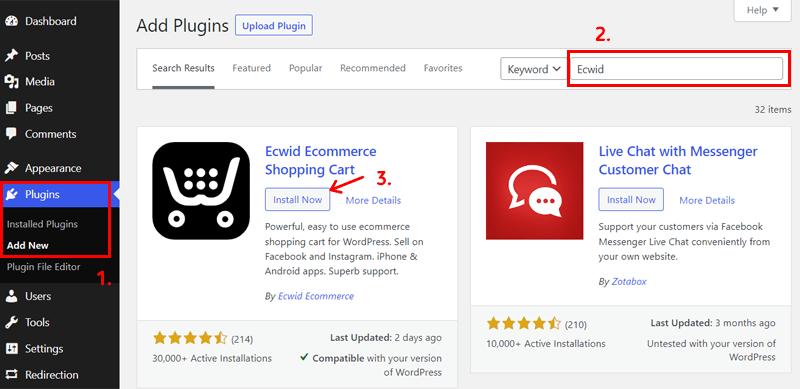
Is Shopify Easy to Use?
On the other hand, Shopify also gives a smooth experience for building an online store. More than the setup process, using the software is easier than Ecwid.
To begin, you must open the Shopify website first. Every plan in Shopify comes with a 14-days free trial. So, it’s best to go with that option by clicking on the Start free trial button.
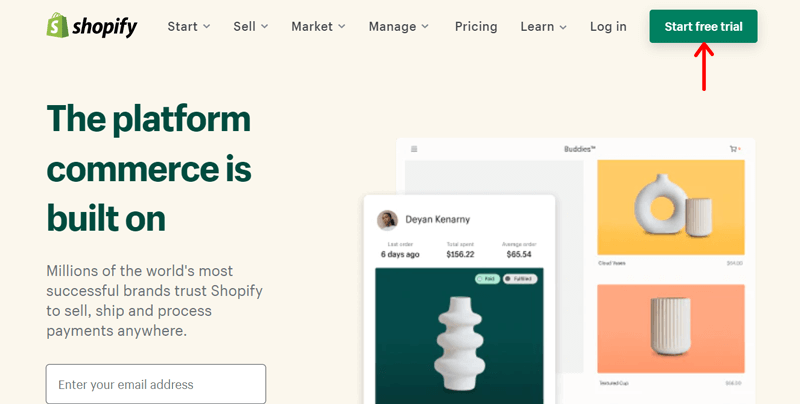
By doing that, a form will open up, where you need to enter your credentials and add a store name. Then, you must click on the Create your store button.
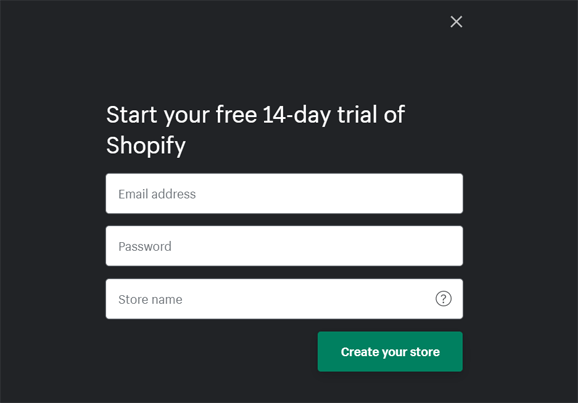
After that, you’ll see a series of questions about your store. Choose the appropriate options, and you can move forward by clicking the Next button. Or just click the Skip button to skip them.
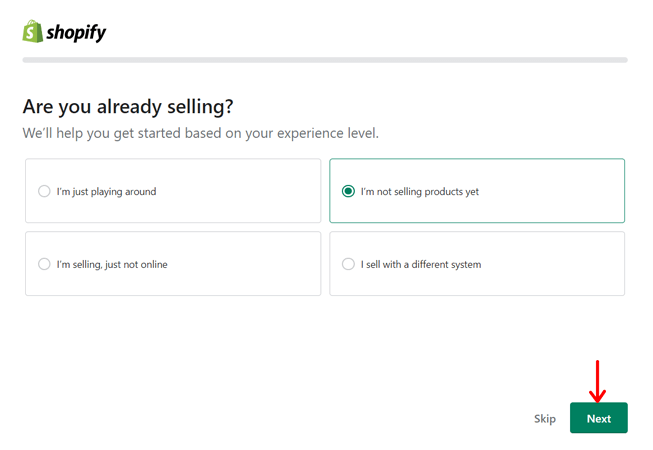
Once you complete the setup process, your Shopify dashboard opens up which looks like this:
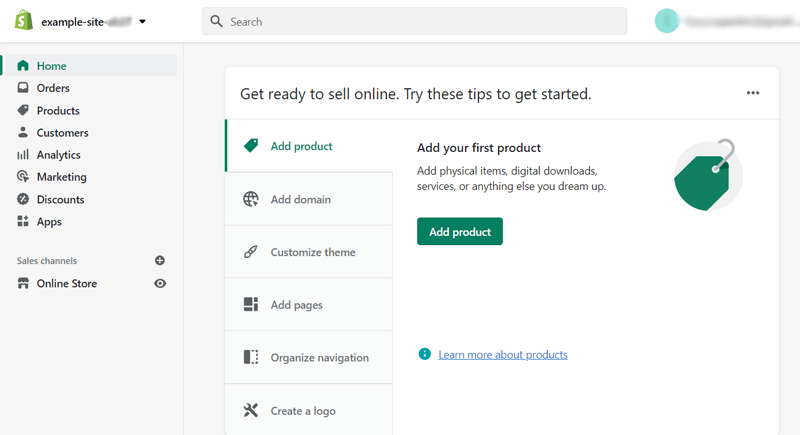
Similar to Ecwid, you can see all the menus on the left side. And its corresponding options will display on the right side as you click one.
Currently, you’re in the Home menu with tips on all the steps to build an eCommerce site. Other than that, there are other menus like Orders, Analytics, Customers, etc.
So, let’s see how simple it is to add a product on Shopify!
Adding Your Products to Shopify
In the Home menu, you can click on the Add product button present in the Add product option. Else you can also go to the Products menu and click on the Add your products button.
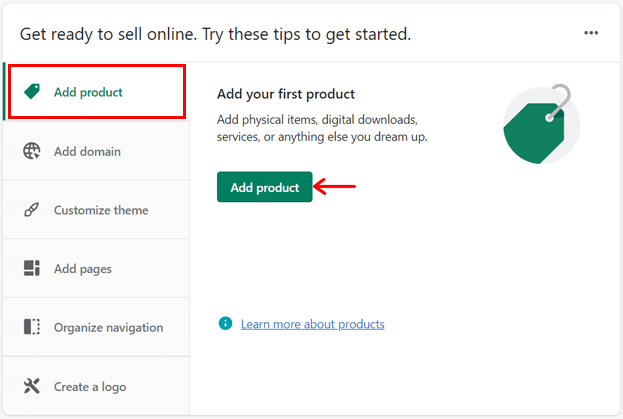
Now, a form will show up where you can enter the product information. That includes the name, description, image, pricing, shipment, and more.
Lastly, make sure to choose the Product Status as Active. Then, click on the Save button.
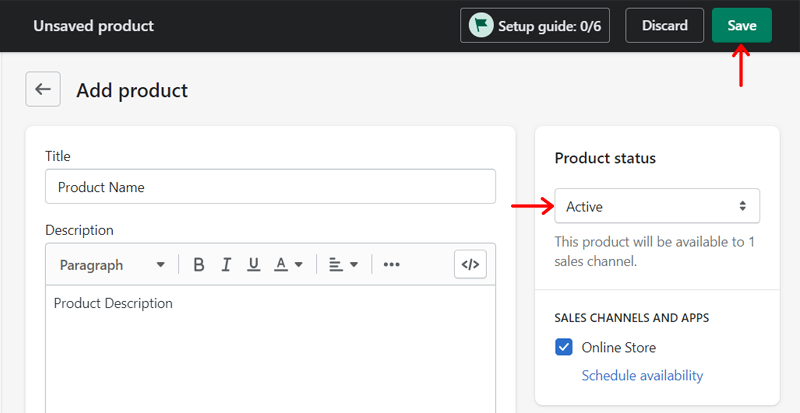
It’s so simple. Isn’t it?
Winner? – Tie
In conclusion, both Ecwid and Shopify are easier to use overall. That’s because the setup process of Ecwid is very simple. And the dashboard and steps to perform actions in Shopify are really easy.
Since both platforms have their own merits in different ways, we declare both winners of this round. No doubt, small to large businesses can easily carry out their activities using them.
D. Ecwid vs Shopify – Design and Templates
One way to grab visitors’ attention is to create a beautiful website. If they feel that your shop gives a smooth experience, then there is a high chance that they’ll buy a product.
Thus, we’ll look at the design and template options in Shopify and Ecwid. Since those are the main reasons that’ll help you make an eCommerce site what users desire.
Design and Template Options in Ecwid
Generally, an eCommerce platform comprises multiple themes. But this isn’t the same in the case of Ecwid.
Ecwid can work as a widget. So, it can integrate with any existing site and convert it into an online store. It means Ecwid blends into the theme style you’re using on your existing site.
Moreover, it gives you limited customization options including Ecwid blocks like Store Categories Menu, Product Search Box, etc.
Thus, your new store’s design will automatically reflect your site’s template, font, and colors. It also depends on the platform you’re using to build the site. Here’s how it looks on WordPress.

However, things are different when you’re creating a brand new site by Ecwid. In such a case, you’ll get a free ‘Instant Site’ theme option to quickly set up an online shop.
So, you can pick a design theme from a variety of amazing options. These themes are also available in multiple categories to suit different kinds of stores.

Once you select your theme, you can customize the store, about page, contact information, etc., in the customizer.
Design and Template Options in Shopify
Shopify gives more options when it comes to themes, design, and templates than Ecwid. Since it includes 10+ free and 70+ premium templates that are stunning for eCommerce sites.
The premium themes cost you around $100 to $250 on average. The prices are comparatively high. But the quality is the best for your store.
In the Shopify Theme Store, you can find all those themes under multiple categories. There are professional-looking templates for clothing & fashion, electronics, and more types of shops.
Moreover, you can also search for themes that are trending, best-seller, minimalist, etc.
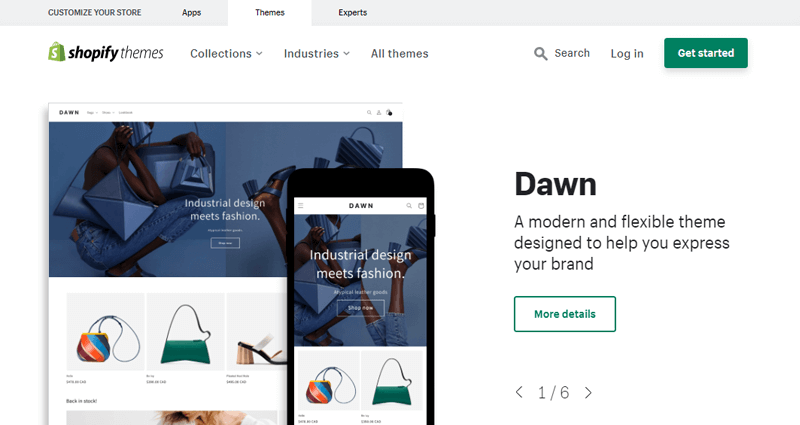
Now, let’s check out the customization options.
First, you need to choose a suitable template for your eCommerce site. Each template consists of its own theme settings. Using these settings, you can easily customize the site design of your store.
Moreover, you get to upload a logo and alter the fonts or colors to match the store with your style and brand. Plus, you can add custom HTML and CSS codes to further style the site.
Not only that, but you can customize your homepage’s layout. Also, you can add banners, slideshows, and other attractive elements to the site. And doing that is also easy because of its web-based website builder.
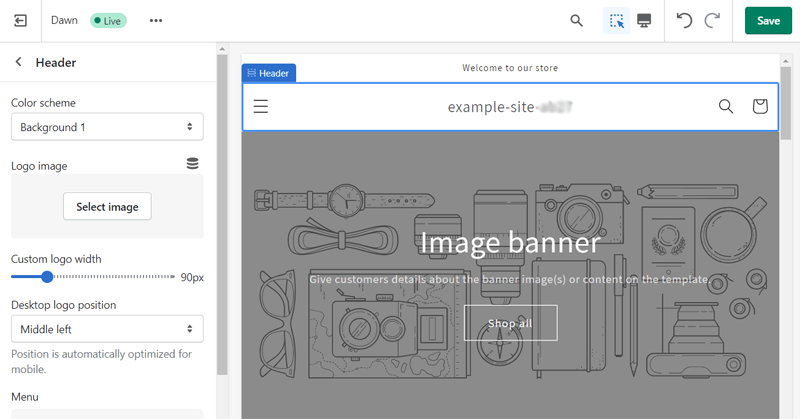
Lastly, you’re good to go by launching the store online!
Winner? – Shopify
Ecwid includes more free themes than Shopify. Also, the store design elements adjust with the theme you use on your existing site. However, the customization options are limited.
Whereas there are more themes in Shopify in total. And they suit various industries of business. Also, the customization options are way more in Shopify, which helps you build a unique store. Because of more design and template options, Shopify wins this round, yet again!
E. Ecwid vs Shopify – Apps and Integrations
Now, we’re going to see the different apps and extensions Ecwid and Shopify provides. That’ll state the degree of integration these platforms have for adding extra functionalities to the store.
So, let’s start by going through the apps of Ecwid!
Apps and Integrations of Ecwid
Ecwid offers several powerful apps, tools, and extensions that you may need to grow your businesses. You can check out all of them in the Ecwid App Market.
Further, it contains both free and premium apps. Currently, there are 40+ free apps. While other premium apps are available with a lifetime purchase option or via monthly-based subscriptions.
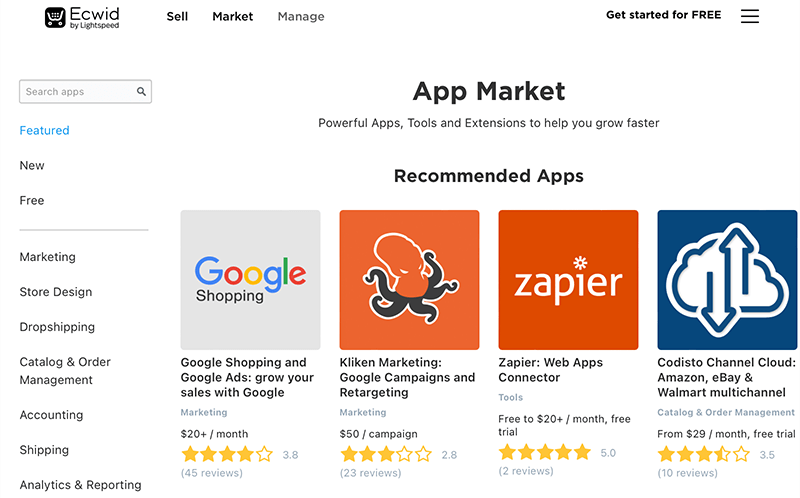
In addition, you can easily find the recommended, new, and free apps for your online store. Moreover, go through them by choosing the category of app. There are apps for marketing, store design, shipping, accounting, and lots more.
Some popular apps in Ecwid are:
- HubSpot
- ConvertKit
- Constant Contact
- Poptin
- Store Designer, etc.
Apart from that, you can also get API access for directly integrating to other popular platforms.
Apps and Integrations of Shopify
There are 7000+ apps of multiple varieties to scale your business in Shopify. Using them, you can give your desired features to the store. You can check all of them in the Shopify App Store.
There, you can find the most popular and the latest apps that are in growing demand. Apart from that, browsing them based on their categories is also possible.
Some types of apps are store design, marketing, conversion, customer service, etc. Using them will help you to bring more customers, sell more items, customize the store, etc.
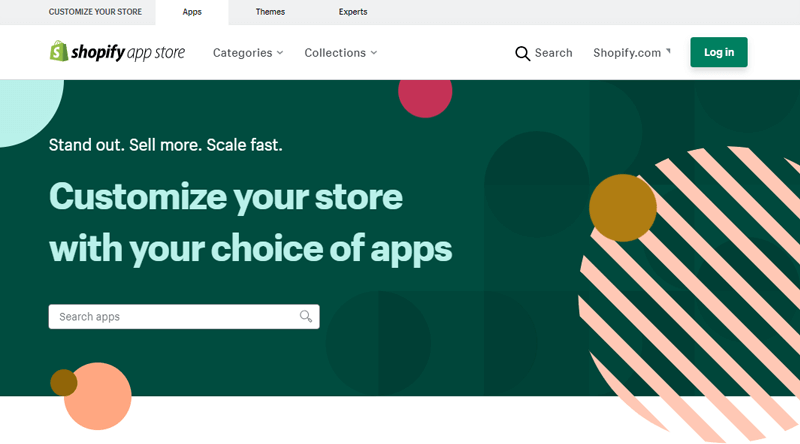
Here are some of the popular apps you may want to use:
- Point of Sale
- Shopify Email
- Product Reviews
- Mailchimp
- Geolocation, etc.
Winner? – Shopify
Ecwid may include more free apps than Shopify. But Shopify includes a vast number of apps relative to Ecwid. Basically, you can find apps to add any function to your store in Shopify.
On top of that, searching for an app is also simpler in Shopify than in Ecwid. Due to these benefits, Shopify wins in terms of Apps and Integrations.
F. Ecwid vs Shopify – Pricing
We’ve gone through all the key features and options in Ecwid and Shopify. Now, it’s time to check out their pricing plans. With that, you’ll know how much it may cost to build a store.
So, go through them and wisely choose a platform with a pricing plan that comes under your budget.
Pricing Plans in Ecwid
Ecwid offers a free plan that you can use forever. If you’re a beginner, then you can easily launch your online store with the free plan.
The free plan gives some basic features. Such as adding up to 10 products, unlimited bandwidth, instant site builder, promotional features, chat support, etc.
For exclusive features, you need to purchase a premium plan that’s available in the following options:
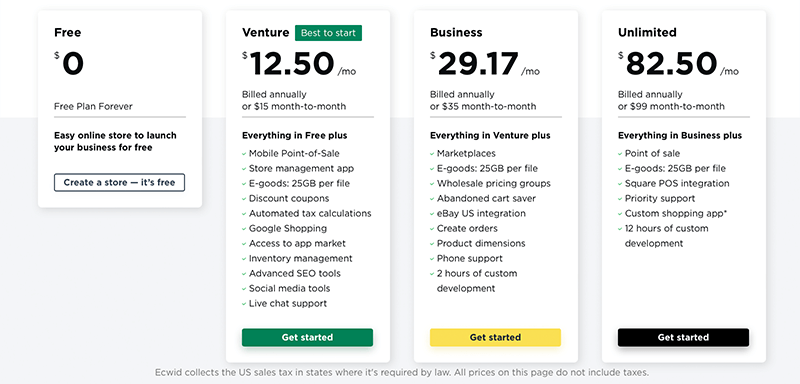
- Venture: $12.5/mo billed annually or $15/ mo billed monthly, advanced SEO tools, discount coupons, Store management app, and lots more.
- Business: $29.17/mo billed annually or $35/ mo billed monthly, all Venture features, abandoned cart saver, marketplaces, etc.
- Unlimited: $82.5/mo billed annually or $99/ mo billed monthly, all Business features, Point of Sale, priority support, etc.
Not to mention, Ecwid offers a full-hosted eCommerce solution powered by Amazon Web Services. Also, you can use it to build an online store on your existing site hosted on any platform.
Moreover, Ecwid doesn’t take any hidden setup or transaction fees when choosing any plan. However, there aren’t refund or money-back guarantee policies in it either.
So, you should start with the free plan and choose a perfect premium plan for your growing store later.
Pricing Plans in Shopify
Shopify is a premium platform available in multiple plans. When you buy a plan, you’ll not just get the website building function. But also all the hosting, domain registration, and maintenance features.
Here are the pricing plans of Shopify:
- Basic: $29/mo, unlimited products, 2 staff accounts, 4 inventory locations, basic reports, etc.
- Shopify: $79/mo, all Basic features, 5 staff accounts, 5 inventory locations, standard reports, and lots more.
- Advanced: $299/mo, every Shopify feature, 15 staff accounts, 8 inventory locations, advanced reports, etc.
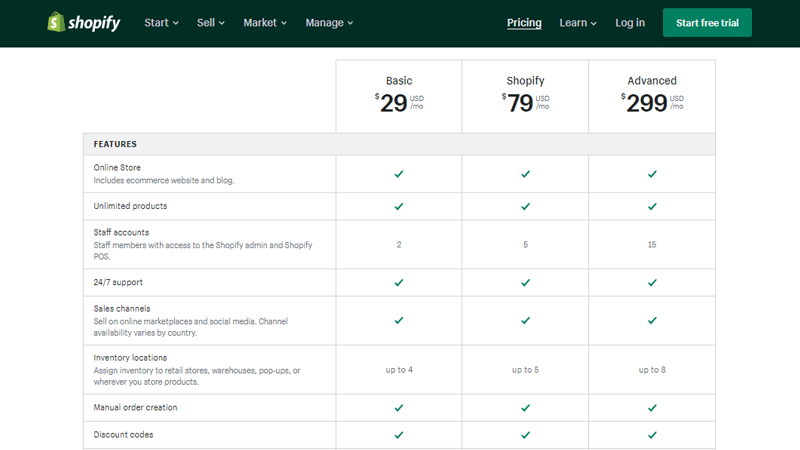
Besides these plans, it has 2 other separate plans:
- ShopifyLite: $9/mo, offers gift cards, accepts card payments, financial reports, and more.
- ShopifyPlus: $2000/mo, contains 60% faster checkout, 3D media on product pages, etc.
Unlike Ecwid, Shopify provides a 14-days trial option that we recommend you to try. You just need to enter your email address and use Shopify without entering the credit card details.
But when using an external payment gateway, you need to pay an additional transactional fee. So, it’s 2%, 1%, and 0.5% fees for Basic, Shopify, and Advanced plans, respectively.
Winner? – Ecwid
In this round, we’ll say Ecwid is the winner. That’s because it comes with a forever-free plan that Shopify doesn’t. Moreover, the starting price of Ecwid is relatively less costly than on Shopify. Also, it doesn’t include any transactional fees that Shopify does.
But we agree that Shopify comes with a free trial on its premium plans that Ecwid doesn’t. However, Ecwid is the ultimate winner here!
G. Ecwid vs Shopify – Customer Support
When you get stuck while building a website, you look for support options to get help. So, let’s find out which platform gives better customer support between Shopify vs Ecwid.
Customer Support Options in Ecwid
Suppose you’re using the free WordPress plugin. Then, you can go to the Ecwid Support section on WordPress.org. There, you can mention your queries and wait for the support team to reply.
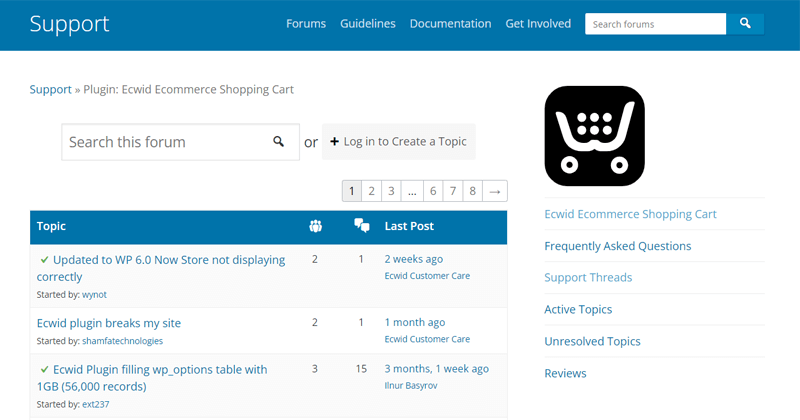
For instant support, you can find several other support options on its official website. First, you can visit the Ecwid Contact Support page. There, you get to send an email to the team or live chat. These options are available 24/7 from Monday to Friday.
Further, phone support is also available (if you give a call-back request in chat). And the time duration is from 2:00 PM to 10:00 PM PDT. However, this option is only for Business and Unlimited plans.
In addition, there’s the Ecwid Help Center, where you can check out its comprehensive documentation. It also includes links to guides, video tutorials, webinars, and lots more.
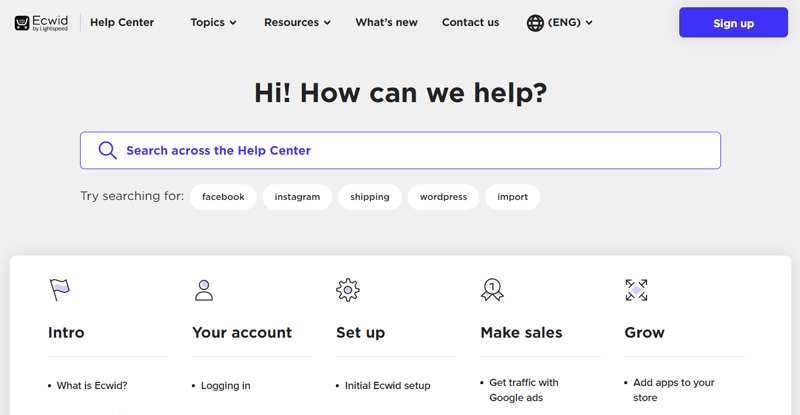
Customer Support Options in Shopify
Shopify also provides 24/7 customer support to every user. You can go to the Shopify Help Center and find all the resources. That includes detailed documentation on several topics. Plus, there are links to video tutorials, webinars, Shopify community, podcasts, and more.
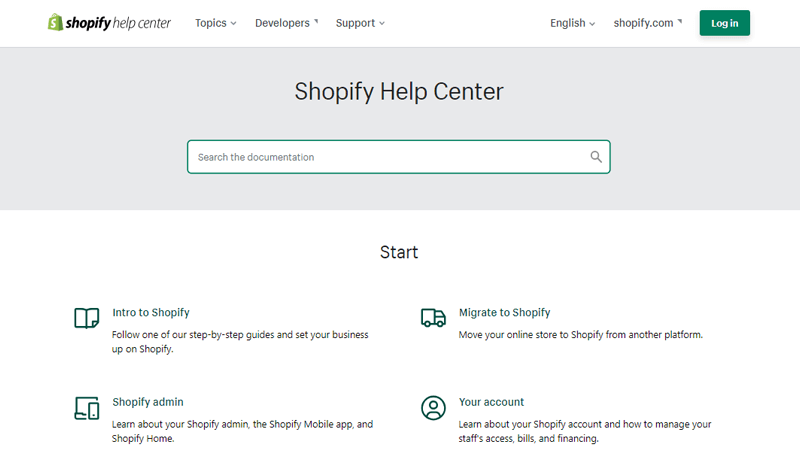
Other than that, you can see the Contact Support option. By going to that page, you get to select the area of customer support required. Then, you’ll get related FAQs and articles to help you begin.
Depending on your query, you’ll get more options. Such as the ability to send an email to the expert team, live chat, etc. Also, logging into Shopify with your account opens more support options.
Winner? – Tie
Both Shopify and Ecwid are neck-to-neck when it comes to customer support. Shopify has an expert team and an intelligent system. Since it shows the various support options that you may need depending on your query. This is what we like about it the most.
On the other hand, Ecwid has a free plan that enables you to get help from a larger community. And because both platforms offer all the major support options, we’ll keep this round as a tie.
H. Ecwid vs Shopify – Comparison Table
| Features | Ecwid | Shopify |
| Overview | Best if you have an existing site and want to convert it into an online store. | Able to create an eCommerce site from scratch. |
| Ease of Use | Easy to set up and decent user interface. | It has a decent setup process and an easy-to-use interface. |
| Payment Gateways | 70+ payment gateway integration. | 100+ payment gateway integration. |
| Mobile App | Yes | Yes |
| Transaction Fee | No hidden or transaction fee. | Includes transaction fee when using an external gateway. |
| Design and Templates | Store elements adjust with the existing site’s theme. For a new site, it has an Instant Site option with some themes and customization options. | Includes 10+ free and 70+ premium themes with several customization options. |
| Apps and Integrations | Limited apps and integrations. | Contains 7000+ apps of a wide variety. |
| Pricing | Includes a free plan. Starting price of the premium plan is $12.5/mo (cheaper). | No free plan. Starting price of the premium plan is $29/mo (costly). |
| Free Trial | No | Yes |
| Customer Support | Email, phone call, priority support, community forums, etc. based on your chosen plan. | Email, live chat, FAQs, video tutorials, and more. |
| Rating | 4.1/5 – Trustpilot TrustScore 4.8/5 – G2 Reviews | 1.6/5 – Trustpilot TrustScore 4.3/5 – G2 Reviews |
I. Ecwid vs Shopify – Pros and Cons
Now, in this section of Ecwid vs Shopify, let’s find out the pros and cons of both platforms.
Pros and Cons of Ecwid
Pros of Ecwid
- Includes a forever-free plan that allows you to sell a maximum of 10 products.
- Able to sell products from your existing site, social network page, or mobile app.
- Comes with Point-of-Sale (POS) system to accept payments from anywhere.
- Offers the Instant Site option to build an online store easily and quickly.
- Integration well with 50+ payment gateways.
- Supports translation to 45+ multiple languages for growing globally.
- Comparatively, the pricing plans are cheaper.
- Performs automated taxes calculation on transactions.
Cons of Ecwid
- The free plan offers limited features for an online store.
- Limitations in the customization and design options.
- Doesn’t include any refund or money-back guarantee policy.
- Relatively, the apps and integrations of Ecwid are fewer.
- Not the best in terms of SEO and security features.
Pros and Cons of Shopify
Pros of Shopify
- A fully hosted platform that gives a domain, SSL certificate, and web hosting service.
- Includes tons of highly customizable and eye-catching themes and templates.
- Offers a 14-days free trial without the need to enter credit card details.
- Comes with a powerful mobile app.
- Suits any small to large eCommerce business.
- Gives 24/7 outstanding customer support to its users.
- Allows the addition of custom HTML and CSS codes for better design.
- Integration to 100+ payment gateways.
- Good in terms of SEO and security.
Cons of Shopify
- Relatively, the cost is expensive.
- Includes transactional fees when using an external gateway on all of its plans.
- Doesn’t contain a free plan.
J. Ecwid vs Shopify – Final Verdict
In the end, it’s your choice to choose a suitable platform for your online store. All we can do is guide you to choose the best one for your online shopping business.
If you already have a site hosted on a platform, then you may prefer using Ecwid. It allows you to sell on several platforms apart from your site. That includes a mobile app and social sites.
On the other hand, Shopify gives you everything you need to kickstart your business. It comes with the web hosting service plus domain and SSL. So, you can instantly set up an online shop.
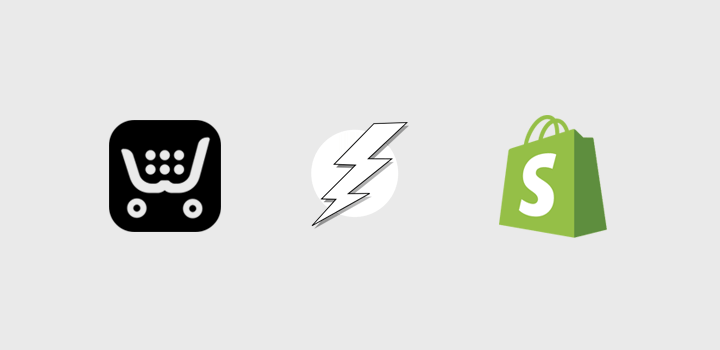
In case we have to recommend one, then it would be Shopify. Because it comes with more options for templates, apps, tools, customization, and others. However, it’s a paid platform. That’s why it is best suitable for small to large businesses.
So, for a beginner, Ecwid can be a better option since it comes with a free plan. Also, the starting price is a little cheaper. And this platform is ideal for small to medium businesses.
But, we also suggest using the free plan (Ecwid) or free trial (Shopify) first. Then, accordingly, you can select a plan that suits your needs.
Not to mention, there are several other eCommerce platforms that you can consider using. One of which is WooCommerce. So, check out our comparison between Ecwid vs WooCommerce and WooCommerce vs Shopify.
Conclusion
That’s it! You’ve reached the final destination. After comparing Ecwid vs Shopify, we hope you’ve made your choice.
Both Ecwid and Shopify are the top eCommerce platforms in the market. Choosing any one of them is a great deal if it matches your needs. Not to forget, Ecwid is for those with an existing site while Shopify allows you to kickstart your eCommerce site from scratch.
In case you ask to name which one we prefer, then it would definitely be Shopify. Since it comes with more features and flexibility that suit any online selling business.
If you’ve already used these platforms, then we’ll be happy to know your experience. Also, post down a comment if you’re confused. We’ll be there to help you as much as we can.
Don’t forget to look at some of our helpful articles on the best multivendor eCommerce platforms for marketplaces and the best eCommerce WordPress themes.
